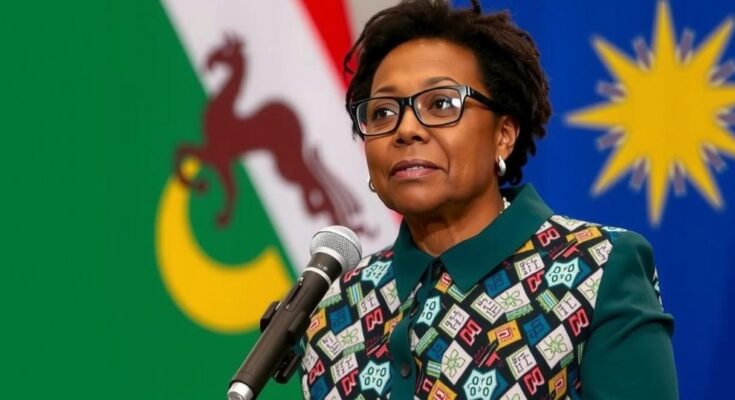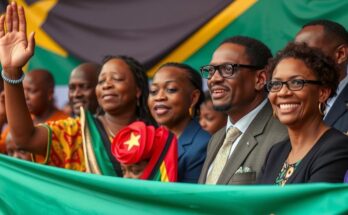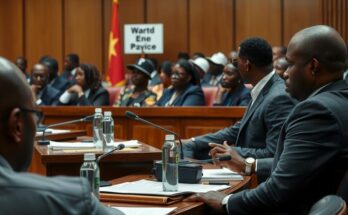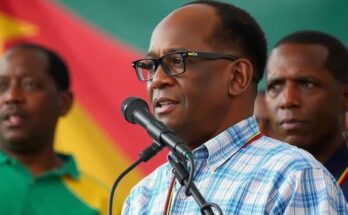Namibia’s Vice President Netumbo Nandi-Ndaitwah is leading in early results for the presidential election held on November 27, 2024. The election faced significant technical issues, prompting an extension of voting, which the opposition claims undermines the process. Nandi-Ndaitwah holds approximately 56% of the votes counted, while the opposition intends to challenge the election’s validity. The situation reflects broader electoral tensions in the region.
Namibia’s Vice President Netumbo Nandi-Ndaitwah, representing the ruling South West Africa People’s Organization (SWAPO), is currently leading in early results from the presidential election held on November 27, 2024. However, the election has been marred by significant technical issues, including a shortage of ballot papers, which necessitated an extension of voting for three additional days. The opposition has voiced strong complaints, deeming the results invalid and asserting that the extension was illegal, jeopardizing the electoral process in a nation known for its stable democratic practices since gaining independence in 1990.
As of the partial results released, Nandi-Ndaitwah has garnered approximately 56% of the votes counted thus far, while her closest challenger, Panduleni Itula of the Independent Patriots for Change, has secured around 27%. With only 220,000 out of an estimated 1.4 million votes tallied, the final results will be crucial in determining the legitimacy of the electoral process and in shaping the future political landscape of Namibia.
Nandi-Ndaitwah, if victorious, would mark a significant historical moment as Namibia’s first female president. Nonetheless, her party has faced considerable discontent among the populace, primarily due to rising unemployment rates and economic challenges that have disproportionately affected the youth. Allegations of corruption within the government have also dampened SWAPO’s reputation as the country’s liberating force. The opposition parties are preparing to jointly challenge the validity of the election in court, emphasizing the need for adherence to democratic principles.
“It is about our country, it’s about our democratic credentials, it’s about the country that must work for everybody, the poor and the rich. It cannot only work for those who want to remain in power by hook or crook,” stated McHenry Venaani, leader of the Popular Democratic Movement and a presidential candidate. The Electoral Commission of Namibia has confirmed that a rerun of the election is not forthcoming despite demands from the opposition for such a measure.
The atmosphere of unrest is not unique to Namibia, as other parties in the region have also encountered a wave of dissatisfaction this year. In contrast, some neighboring countries have seen significant political upheaval, including South Africa and Botswana, where ruling parties have either lost their majority or been ousted from power altogether.
The outcome of this election and the subsequent legal challenges will be closely monitored, as they will likely have far-reaching implications for Namibia’s political stability and governance moving forward.
The recent presidential election in Namibia has drawn attention not just for its leadership implications but also for the challenges it has faced. Technical difficulties, such as a lack of ballot papers and the irregular extension of the voting period, have led to accusations from the opposition regarding the legitimacy of the election process. This election marks a pivotal moment as it could lead to the election of Namibia’s first female president, Netumbo Nandi-Ndaitwah, while also revealing underlying tensions within the country’s political landscape amidst economic frustrations and corruption allegations. Historically, Namibia has been viewed as a stable democracy since its independence from South Africa in 1990. However, recent dissatisfaction with the ruling party SWAPO’s governance, especially concerning economic issues, has sparked a more vocal opposition. Namibia’s voting landscape mirrors regional trends, with several southern African nations experiencing political volatility and discontent with long-standing ruling parties.
In conclusion, the unfolding presidential election in Namibia presents a pivotal moment for the nation, marked by the potential rise of the first female president amid significant procedural challenges. The ongoing opposition challenges to the election results highlight the tensions in Namibia’s political environment, reflecting broader regional discontent with entrenched ruling parties. As the nation awaits final results and possible legal battles, the implications for democratic practices and governance remain critical for the future stability of Namibia.
Original Source: apnews.com




